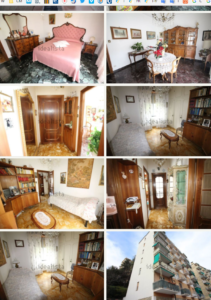Naked ownership and usufruct: implications for the seller and the buyer

“Genoa: liferenter (usufructuary) aged 95 sells naked ownership of apartment of 6 large rooms with two balconies. The apartment is divided into an entrance hall, a large hall, kitchen, two bedrooms, bathroom and pantry. High floor with elevator, sunny panoramic exposure. Only 85,000 €. You can fins good bargains like this on italian real-estate ads, but what is naked ownership in Italy?
The bare ownership is generally an investment option for those who aim at the revaluation of the brick in the long term, without immediate needs or housing (obviously the house remains at the disposal of the usufructuary as long as he is alive), or profitability (purchase to rent).
The years of crisis have pushed the offer of this type of solutions: the 2016 data recorded an increase in the bare-property trade of + 11.7% (24,107 transactions).
What does it mean to buy a property in this mode?
There is no doubt that for those who sell the formula to satisfy the interest of obtaining liquidity, to divest, but without leaving the house and without (as in the case of a regular loan) having to start every month to return the money. If, however, I also have another house in which I live, I can, as an usufructuary or liferenter, make income and also round off my pension.
For those who buy, it definitely involves buying at a reduced price (the younger person the longer the life expectancy), waiting for the moment of death to become a homeowner, then go live or rent it. In the case where the bare property has been sold by owners in communion of property, it is necessary to wait for the death of both to come into possession. This is done as an investment, for example, to give the house to a child who is still small at this time.
What are the tax burdens for naked ownership?
Who buys a bare property pays indirect taxes at ordinary rates: so if it is a principal residence it pays 2% on the price or the cadastral value (if you invoke the value-price). If second home, you pay 9%. Naturally, the tax base is reduced because the value of the usufruct is calculated on the basis of the tables attached to the TU (Single Text Law) and is deducted in terms of registration tax.
As for the subsequent expenses: the direct tax costs (IMU, = property tax etc.) and the expenses of co-ownership, in addition to the expenses of ordinary maintenance, are chargeable to the usufructuary.
Extraordinary maintenance (e.g. roof repairs) remains the responsibility of the bare owner.
Who should enjoy this option?
Buyer side: I buy at a much lower price and I bet on the survival more or less long of the usufructuary to calibrate the times when I can enter the house or rent to earn money.
Vendor side: I immediately receive a small amount of money and do not leave the house. I do not have to (as in the mortgage) return anything. Alternatively I can ask, as payment, a monthly rent or a moral and material help according to the needs. But in the latter two cases the risk of default of the buyer are higher and it will be up to the notary to provide the safeguard clauses of the position of the seller.
What are the other aspects to consider?
From the seller’s side:
- You can continue living at home without risk
- Will have to bear the tax burden
- You will have to arrange regular maintenance at your expense
On the buyer’s side
- You will not be able to enjoy the house before the expulsion of usufruct
- However, it will not be necessary to bear the tax burden
- You will have to pay for extraordinary maintenance
Can we sell the bare property of the house before the death of the usufructuary? Yes.
What is the position of the heirs of those who sell a bare property?
The heirs of the seller will find nothing to inherit because the usufruct is extinguished on the death of its owner. The instrument is an indirect way of disinheriting, but it is necessary that the sale be made at a reasonable price otherwise the heirs could challenge it in court.
Can you buy with a mortgage?
Yes of course. Given the reduced value of bare ownership, even the amount I can claim will be proportional to it. If then I get the consent of the usufructuary to register a mortgage on his usufruct, then the bank will have the guarantee on full ownership and not on the bare property alone, so it could give me a bigger mortgage.